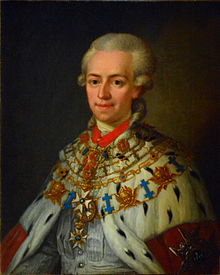Johan Gabriel Oxenstierna
| Johan Gabriel Oxenstierna | |
|---|---|

J.G. Oxenstierna.
|
|
| Born |
19 July 1750 Skenäs, Södermanland, Sweden |
| Died | 29 July 1818 (aged 68) , Sweden |
| Occupation | Poet, Diplomat, Courtier, Member of the Privy Council of Sweden |
| Nationality | Swedish |
| Education | Kansliexamen, 1767 |
| Alma mater | Uppsala university |
| Period | 1769-1815 |
| Genre | Poetry, Diary |
| Notable works |
Natten 1769, Morgonen (1772), Skördarne (1796), Dagens stunder (1805) |
| Notable awards |
Lord of the Realm, Member of the Swedish Academy, Member of the Royal Swedish Academy of Sciences, Knight of the Royal Order of the Seraphim |
| Spouse | Lovisa Kristina Wachschlager (1791) |
| Children | 1 |
| Relatives |
Gustaf Fredrik Gyllenborg Nils Philip Gyldenstolpe |
|
|
|
Count Johan Gabriel Oxenstierna (19 July 1750 – 29 July 1818) is considered one of the foremost Swedish poets of the Gustavian period. A prominent courtier during the reign of King Gustav III of Sweden, he was also a politician, diplomat and member of the Swedish Academy, holding seat number 8. On several occasions he was a member of the Swedish Government and Parliament. Amongst other things, Oxenstierna is also known for his translation into Swedish of John Milton's epic blank verse poem Paradise Lost.
Johan Gabriel Oxenstierna was born at the Skenäs estate, by lake Kolsnaren (now in Vingåker Municipality), in the province of Södermanland. He lived here during his youth with his parents, major general count Göran Oxenstierna, a member of the Korsholm och Wasa branch of the Oxenstierna family, and countess Sara Gyllenborg, and with his grandparents, Margareta Gyllenborg (née von Beijer) and Jan Gyllenborg. The grandparents took active part in the upbringing of young Johan Gabriel - the grandfather until he died in 1752 - as the parents at times resided at Carlsten, due to the fathers military career. He was the oldest of four brothers.
His childhood at Skenäs came to play a leading role in his later authorship in many ways. The beauty of the nature of Södermanland, and the memories of his upbringing there, came to inspire the themes of his pre-romantic publications. His maternal uncle, poet Gustaf Fredrik Gyllenborg, in whose house he spent a lot of time, and his tutor, poet Olof Bergklint, came to inspire his career choice as a poet, as well as his poetry in itself. A person, whose writings he read and admired during this time, and who came to inspire him, was poet Gustaf Philip Creutz.
...
Wikipedia
